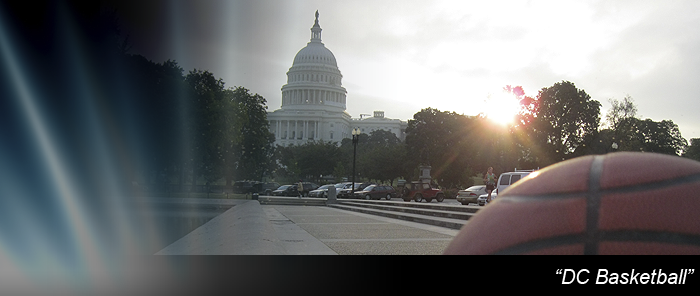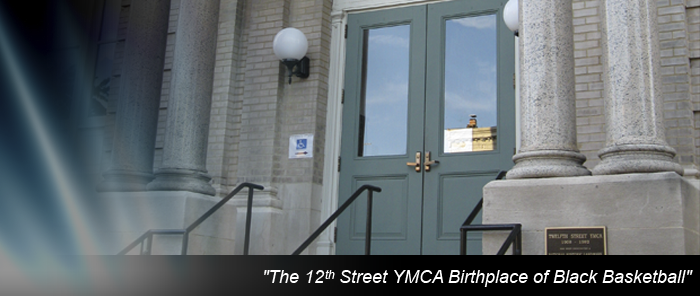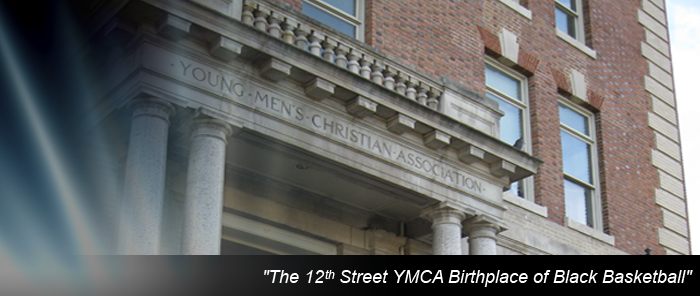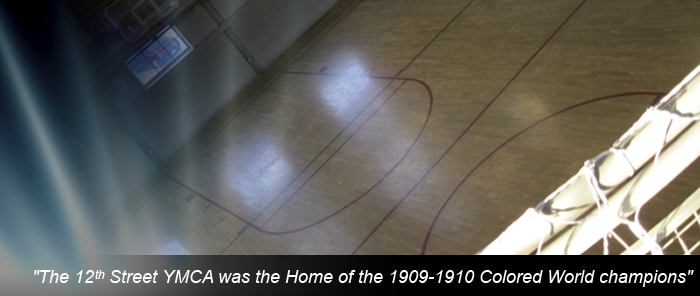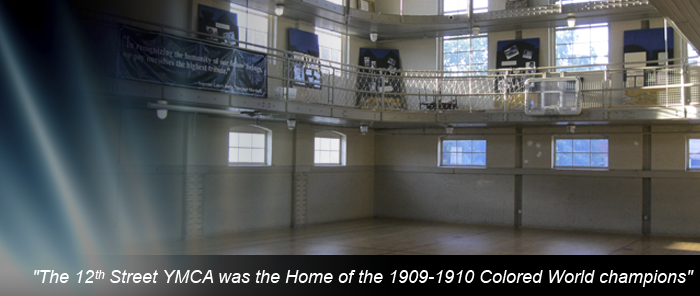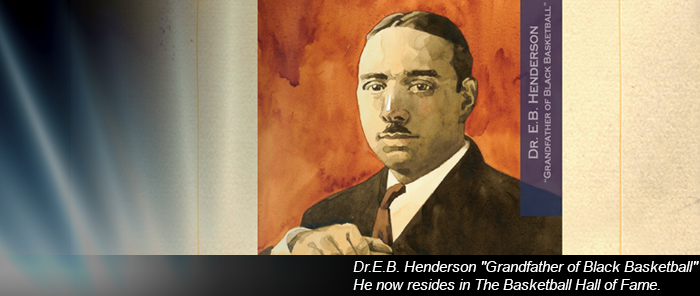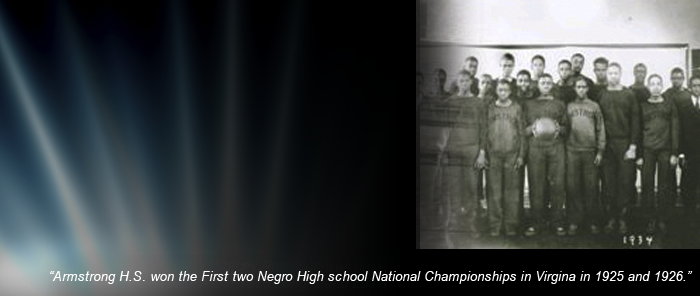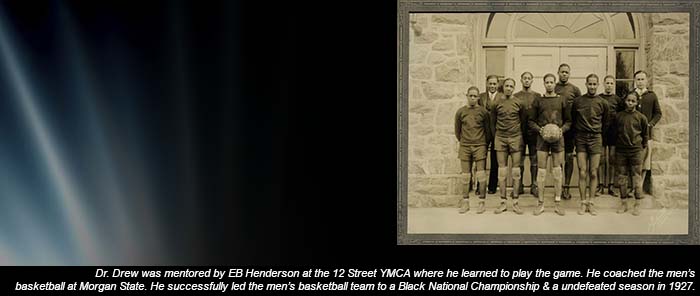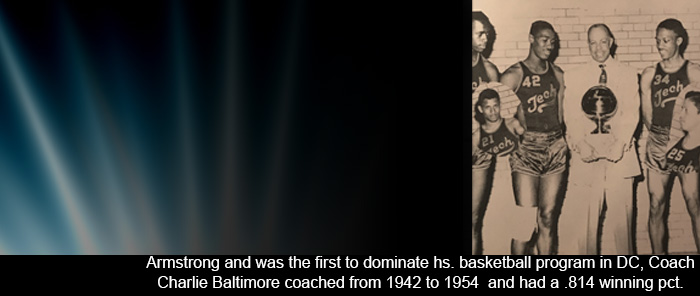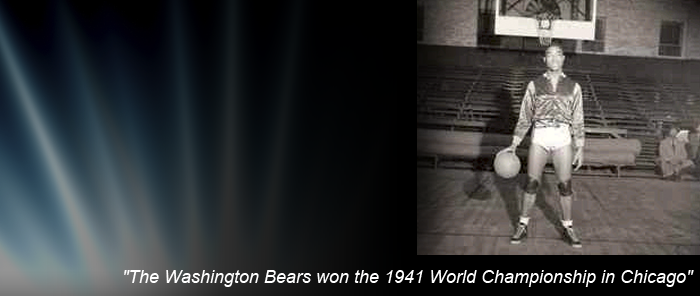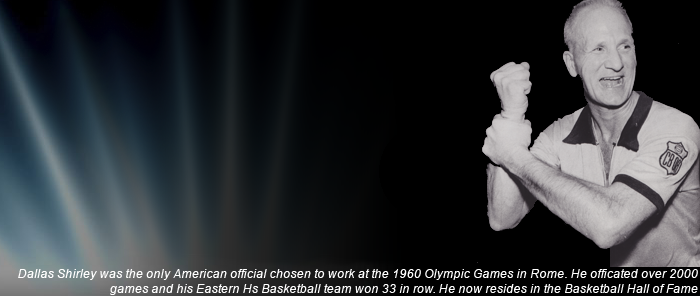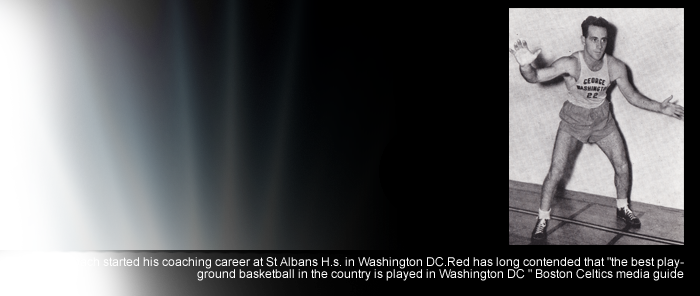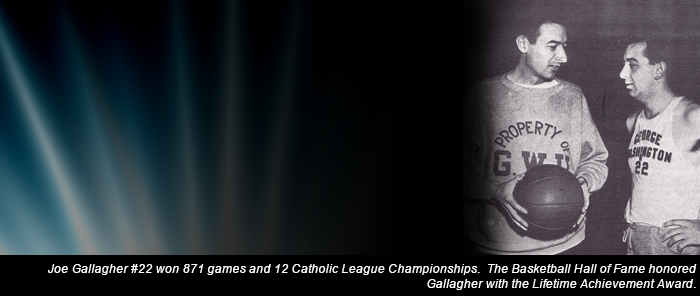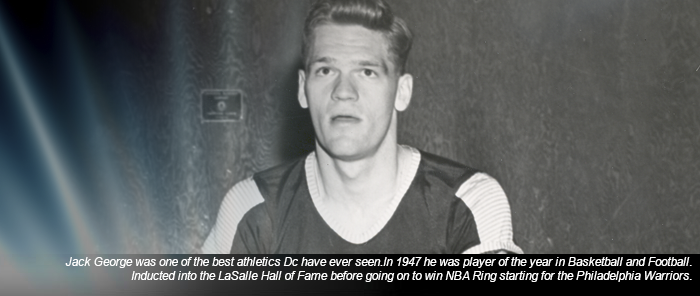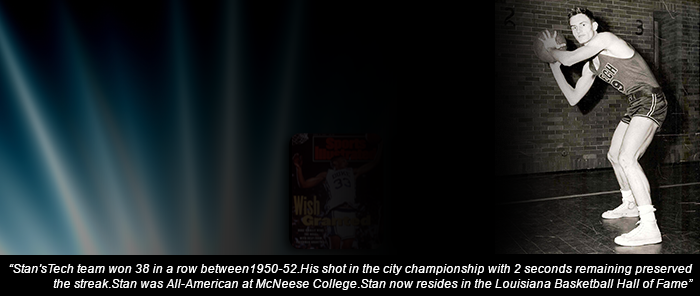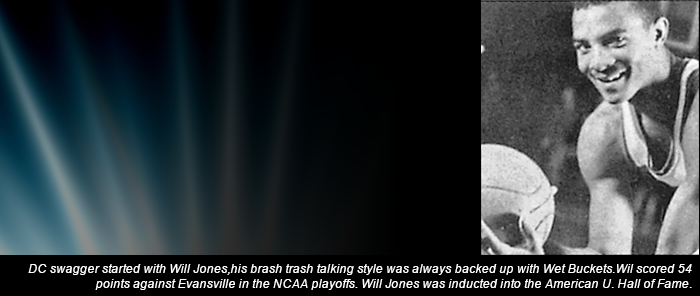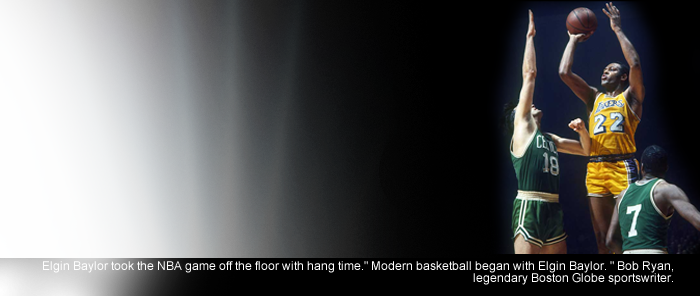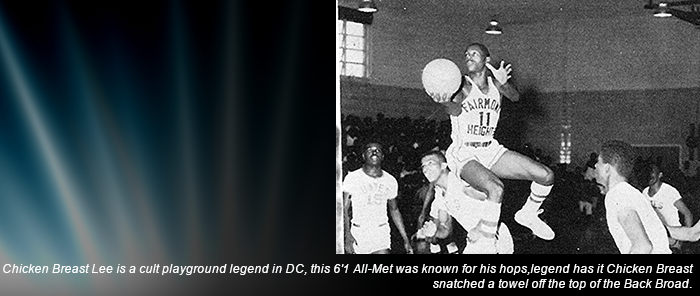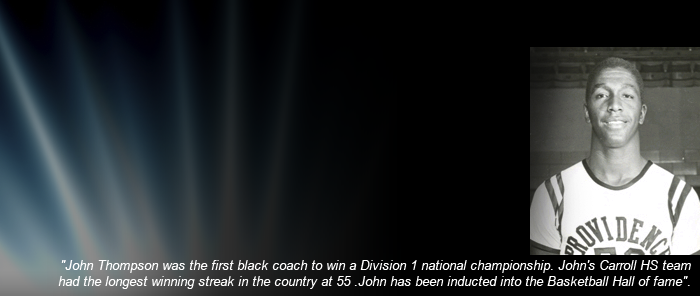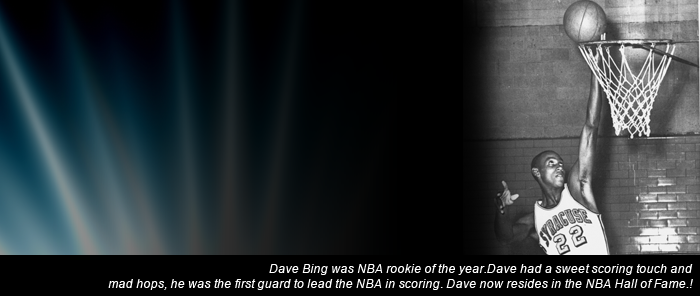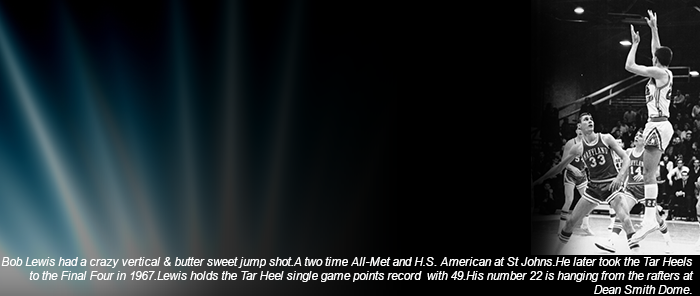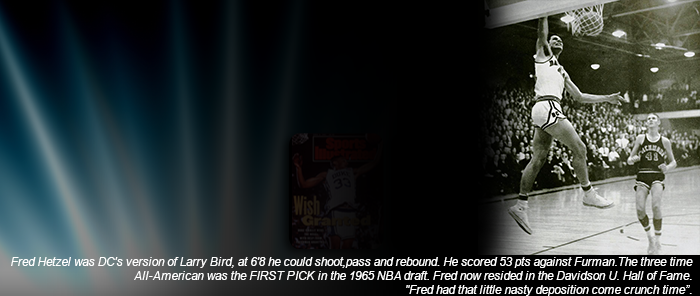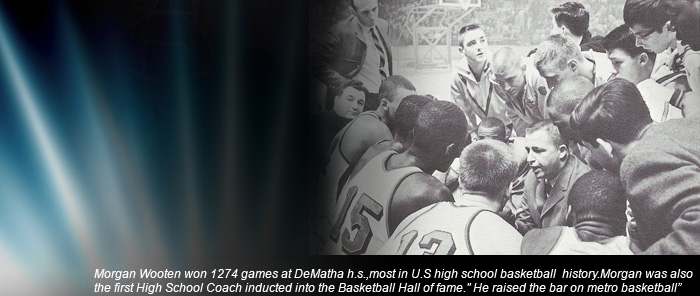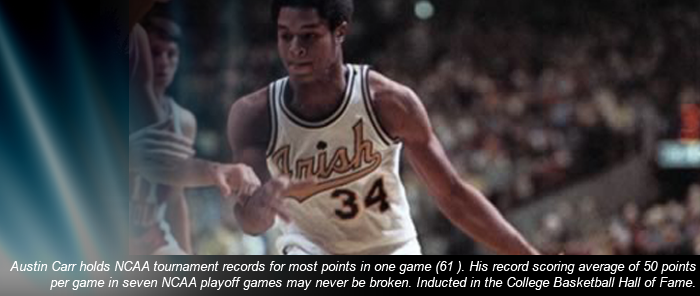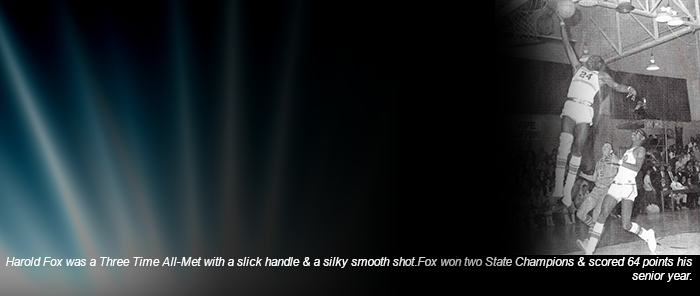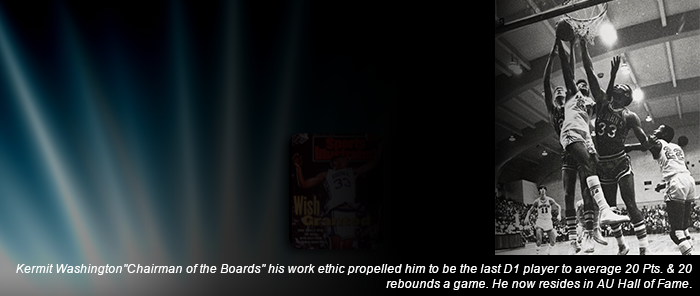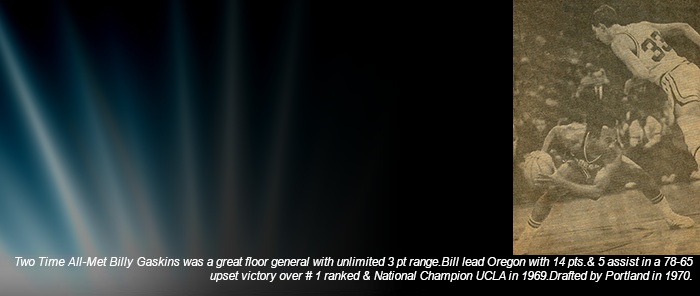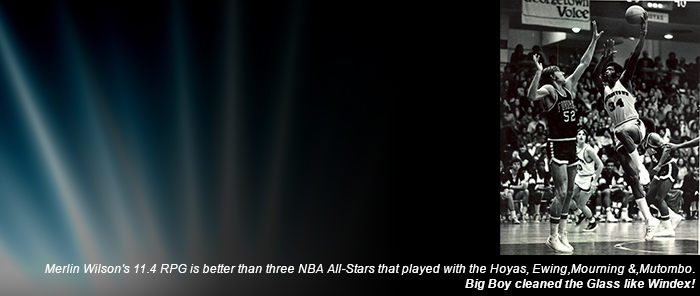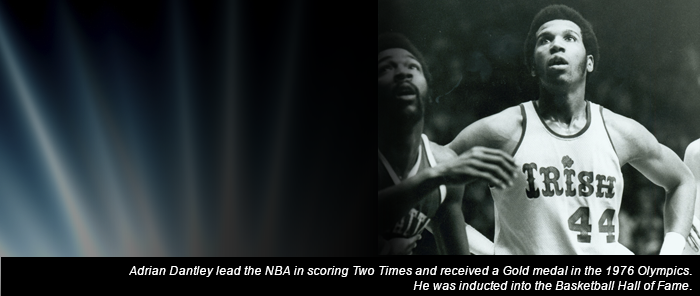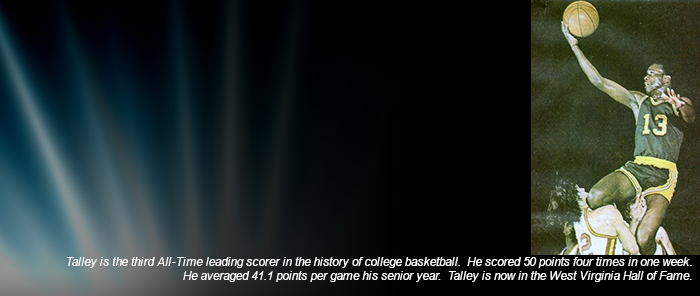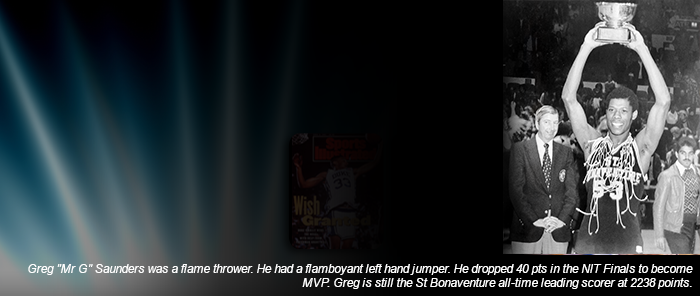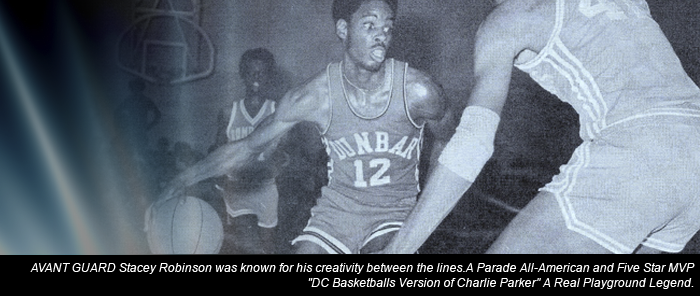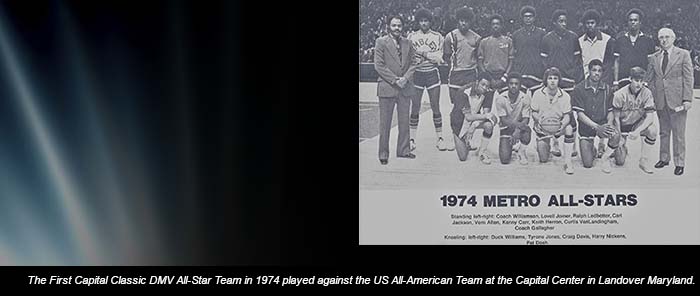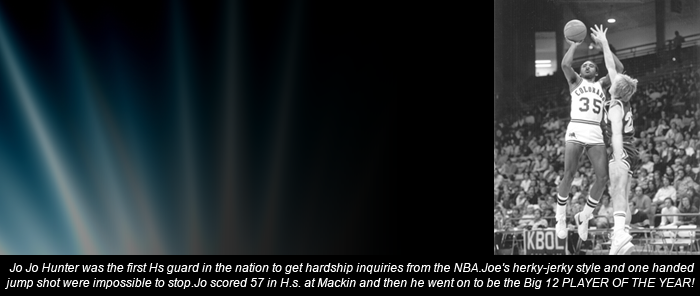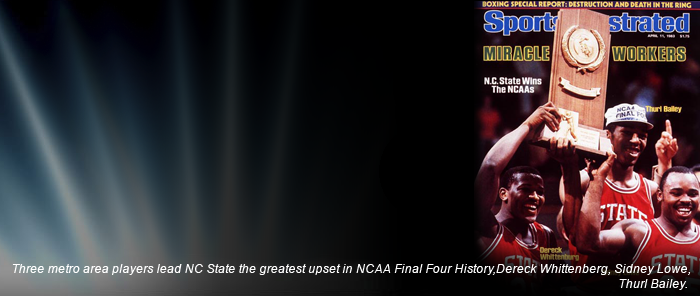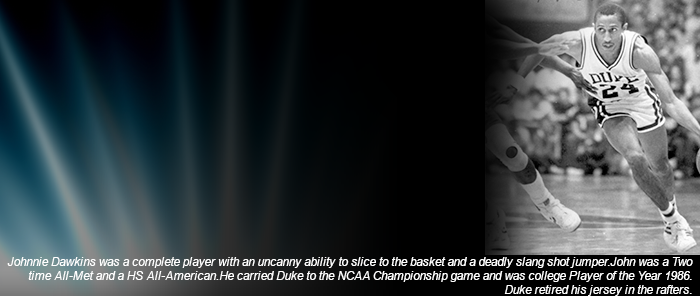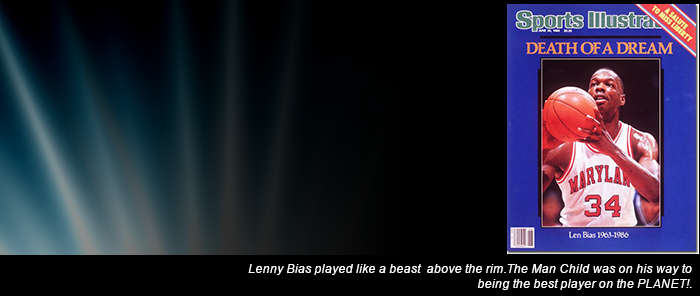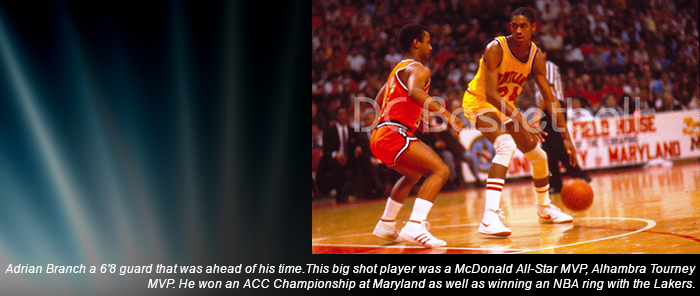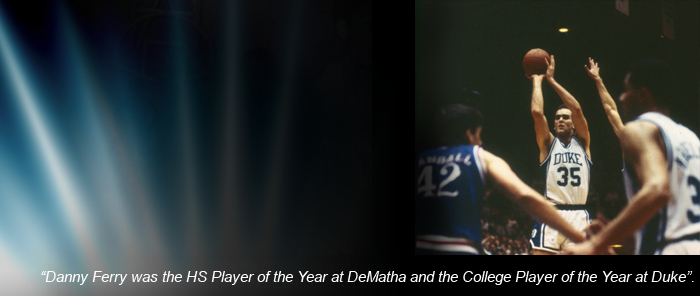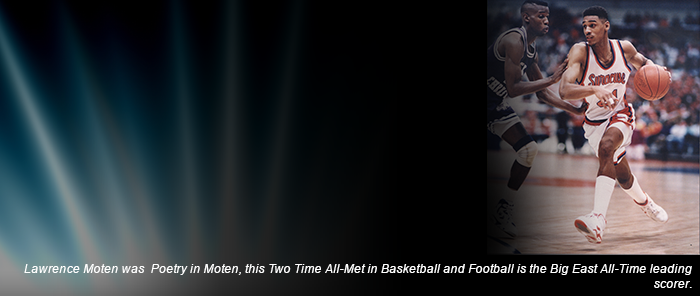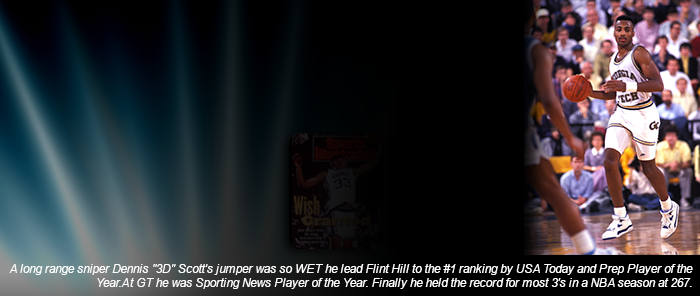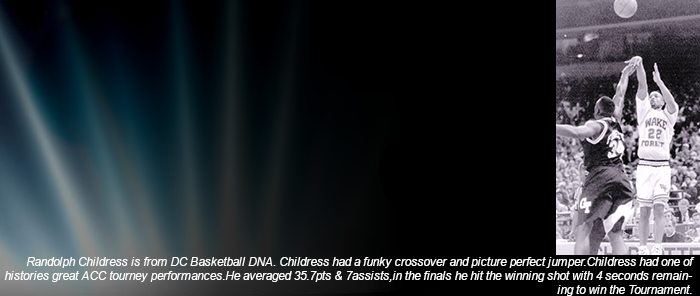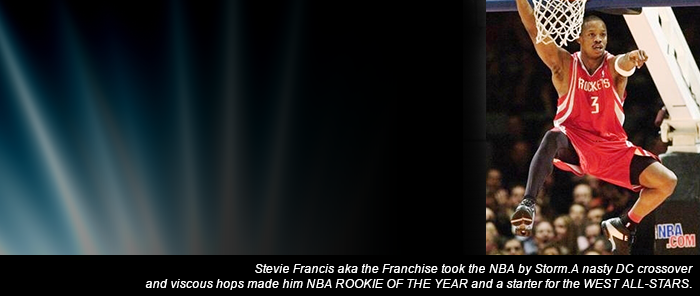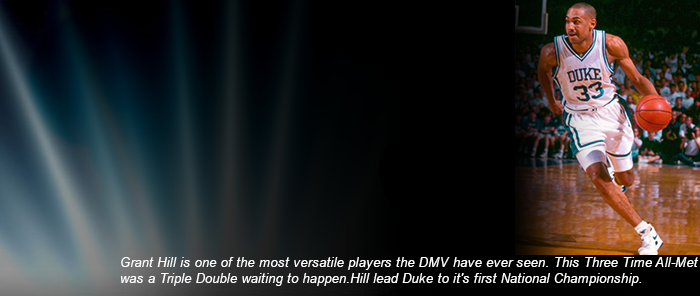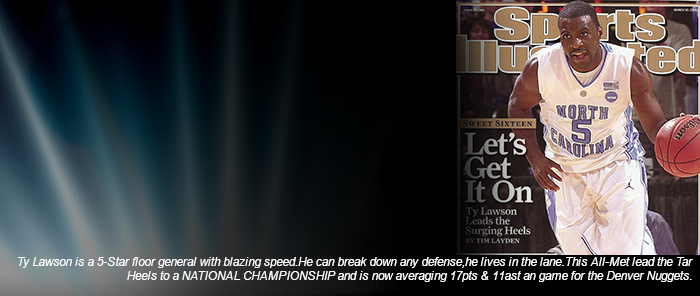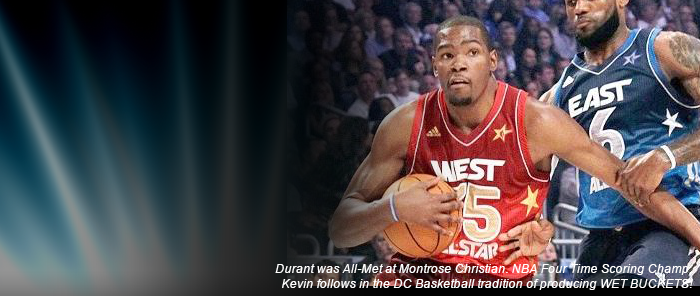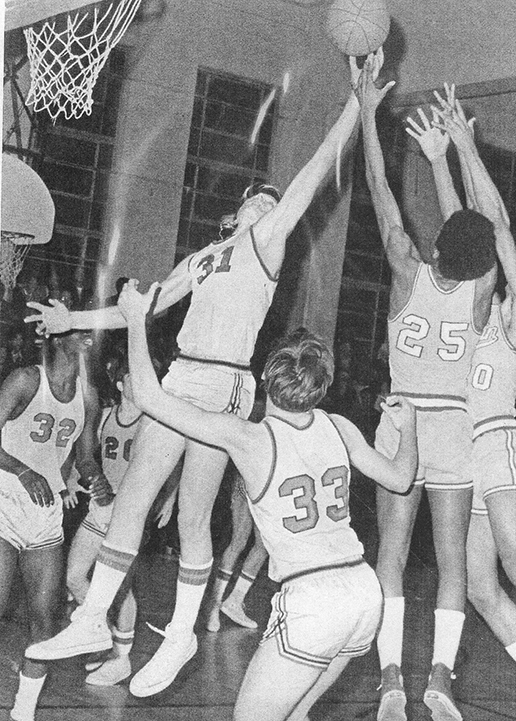
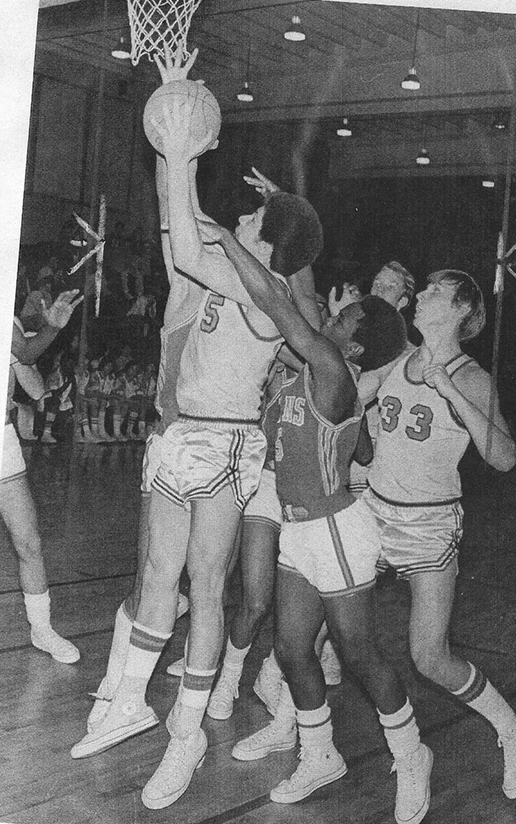

St. Johns and the (Gallagher Factor) snaps the Baltimore Dunbar 48 game win streak
I just saw a great Documentary called the Baltimore Boys and it chronicle the 1982-83 Dunbar basketball team which won 59 in row. Some say the greatest high school team in history. Prior to the 1982-83 team there was another number one nationally ranked Baltimore Dunbar team in 1974.
That great team was led by the coach William Sugar Caine who coached Dunbar for 32 years and lead the basketball program to a 485-105 record. Sug is a Washingtonian who played his high school basketball at the great Armstrong Hs. The great Armstrong program won the first negro high school national championship in Hampton Virginia in 1926. He also played for the world champion Washington Bears 1942, he has Washington DC Basketball pedigree.
A coach, disciplinarian, counselor and father figure to countless outstanding inner-city athletes, Cain culminated his coaching career in 1973 with an 85-71 victory over Washington's powerful DeMatha team at the then-Baltimore Civic Center. That outcome thrust Baltimore -- long considered inferior in talent to Washington, Philadelphia and New York -- into the college recruiting frenzy that still exists today.
That team was lead by a smooth All-American guard named Skip (Honey Dip) Wise. Skip Wise put Baltimore basketball on the map with his brilliant performance in 1973 against Maryland's nationally-ranked DeMatha High School. Wise would score 39 points, including 22 points in the fourth quarter, against an opposing squad led by legendary Coach Morgan Wootten and NBA great Adrian Dantley . Wise would go on to Clemson and become the first freshman to win first team all-conference honors in the Atlantic Coast Conference. A snap shot into Skip's greatness came against the great Maryland team which was ranked third in the country with the NBA # 1 draft pick John Lucas. Skip stole the show with a 30-point performance. He still holds a Clemson freshman record by scoring 38 pts against University of Penn. Drug-related problems would ultimately derail Wise's professional career, but it never diminished the hardwood luminosity he brought to the Dunbar basketball program.
Skip is considered to be the greatest player in the history of Baltimore basketball, that it's and that's all.
I say all that to say one of the greatest basketball victories in Dc Basketball history took place in 1974 at the expense of the Heralded Baltimore Dunbar Basketball program. It was the Knight of Columbus tournament which at the time was concerned the National Championship tournament of high school. St Johns was out of the best high school basketball conference in the country, the Metropolitan conf. That conference had Dematha with Kenny Carr and Hawkeye Whitney both NBA players and another five division 1 players, Mackin had Duck Williams, Keith Herron both NBA players and Jo Hunter the first guard in the nation to get recruited to go straight from high school to the NBA, and Carroll had Al Dutch a preseason All-American that helped jump start the Georgetown program.
St Johns Cadets the 8th ranked team in the metro area with the (NBA Hall of Fame Coach ) Joe Gallagher a (Jerry West style guard) with First team All- Metro credential named Pat Dosh a (coach on the floor PG that could control the games tempo ) named Jay Gallagher and last piece was a ( clever scoring forward) named Larry Cannady. All three players ended up at Division 1 schools. They meet up with the team that put Baltimore Basketball on the map by beating Adrian Dantley, headed by Skip Wise and Larry Gibson. No one thought that they had a chance except Coach Gallagher
After hearing about the Dunbar upset of Dematha over and over I set out to see what happen the next year when St Johns got revenge for the Metropolitan conference and the Metro area with an outstanding upset victory over Baltimore Dunbar and snap there 48 game win streak. So I tracked down Pat Dosh in Richmond Virginia and he give me a play by play description of his journey through basketball as well as what happened that fall at the Knights of Columbus in 1974.This a great story that slip thru the cracks. The interview can be read, or you can just listen to this great story on DCBasketball.com
Penny Greene Interview
with Pat Dosh
Click below to listen to the interview
Penny Greene: Good day Pat Dosh, this is Penny Greene from DCBasketball.com. How are you today, sir?
Pat Dosh: I'm great, Penny and looking forward to the opportunity of talking with you.
Greene: Perfect. I had to track you down, you know. It wasn't easy. I knew you were one of the great players from the 70's. The 70's had a lot of great players, coaches and teams and me being part of the 70's, definitely want to sit down, talk to you and kinda understand your journey, through the game of basketball.
Dosh: Well, that's sounds great. Look forward to it.
Greene: What part of Washington, DC, did you grow up in?
Dosh: Believe it or not, I actually grew up outside of the city, in Kensington, Maryland. I – I probably ten minutes, ten minutes outside of DC, but I ended up going to high school at St. John's, which of course is – is in the city.
Greene: Got 'cha, and if you grew up in Kensington, your local high school would have been Gaithersburg, Perry – what high school would you have gone to?
Dosh: It would've been Einstein and I think we ended up beating them 88 to 44 in my senior year. [laugher] I like to rub that in to folks back home. Yeah, but it would have been Albert Einstein which I don't even think it's around any longer.
Greene: Got 'cha. Got 'cha. – so, once you started going to school, you went to the local middle school in the area before you went to St. John's?
Dosh: Actually, went through catholic schools most of the way, started off at Holy Redeemers School, from grade one through eight, and then went to St. John's for – for my four high school years.
Greene: Perfect. Perfect. And at what age did you start tossing the ball around and getting familiar with basketball – when did that whole process start?
Dosh: How far back can you remember?
Greene: Okay.
Dosh: I think – what about the age of four or five is about as far back as I think I can go, and I was always a tall skinny kid, even when I was that young, so everybody would always say, hey, you know, you really need to work on basketball. I think that's gonna be your sport. I actually played all three sports, through grade school – the three major ones – basketball, football and baseball, and and I would say about the seventh or eighth grade time period is when it really started to click in that I – you know, I had grown to about six two or three by that point and again, just as thin as could be, but I – I really felt like that that was the sport that I gravitated towards and seemed to really enjoy the most and thought I had the greatest future in, so while I continued to play the three sports through the eighth grade, in high school I just played basketball and also played baseball – stopped I I dropped football and most of my summers and most of the year was really just been developing my basketball skills.
Greene: Got 'cha. Did you have a uncle or dad or a older mentor that kinda pushed you into sports, or just – just have a love for it yourself?
Dosh: I actually had a dad that – that played sports and was a prolific scorer. He really scored you know, scored extremely well. I read a lot of the old articles – he was always the high scorer on the team. He didn't play for the school team, he played what was called I guess "club ball" back then in DC – grew up in DC and and had a great love for the game and so I guess I would say he would be the one that I kinda would – was my role model and got me – got me headed in the right direction in the game of basketball.
Greene: Got 'cha. Once you started perfecting some of your skills, was there a local playground or rec center or where were you – in the driveway? Where were you starting to perfect skills?
Dosh: Well, all of the above, to be honest with you, but I really about the – about the eighth or ninth grade time period. It became quite apparent to me that if I really wanted to take my game to the next level, that I quite honestly had to get in an environment where – where there was more blacks playing on the playground.
Greene: Got 'cha.
Dosh: - and so I really tried to focus what I would do on early Saturday morning, is I would wake up early about 7:30, I'd walk about a mile down Connecticut Avenue – this was back in the days of hitchhiking and and I'd hitchhike down to Chevy Chase playground and spend most my Saturdays down there for about nine to five, just on the playground, – the other place I used to like to frequent was a place called Ken-gar, I don't know if you've ever heard of it.
Greene: Okay.
Dosh: It's kinda in the heart of the city in Kensington, and there was some real talent there, but I really tried to – I really tried to always – always play with people that were better than me and –
Greene: Sure.
Dosh: - and really that wasn't too hard to do [laughter] [inaudible] me, but I really tried to always be you know, play with guys that could jump higher or run faster and just had more overall skills than I had and I really think in the long run that ended up helping me quite a bit.
Greene: Well you're bringing back some fond memories, because I remember as a high school guy be invited to play in a – with a team that played at Chevy Chase and if I remember right, there was a C – a Safeway grocery store somewhere close by –
Dosh: Yes it was.
Greene: - and that was kinda shocking cause I remember seeing Red Auerbach out at the courts and I'm like, is that Red Auerbach? What's he doing out here, and he was out watching the games, so that was a – a really cool place to play and so when you brought that –
Dosh: Red Auerbach just actually lives just right down the road from Chevy Chase playground – not far from St. John's at all actually. He and Joe Gallagher were very close friends. As a matter of fact, it [inaudible] Red Auerbach, he – he allowed me to get a little [inaudible] in between my junior and senior year free. He walked into Joe's office one day and said, "Hey, send one of your players to my camp and tell 'em I'll just cover the expenses." So he was a great, great guy and I got to know him a little bit up there – at his camp in Boston that he ran in the summer.
Greene: That's a great story and I – it's funny you said that and it makes all the sense in the world that he was hanging out at the court. I'm like, why is Red Auerbach here?
Dosh: Yep.
Greene: But speaking of camps, obviously you attended your own coach's camp. Morgan and Joe had the most successful camp in the metropolitan area – Metropolitan Basketball Camp I think it was called?
Dosh: I spent my summers there. It was actually nine weeks of the summer from nine o'clock – I think it ran til three or three-thirty – four o'clock every day, and you talk about being around some good talent. I mean, they – well, first of all you got all the Dematha boys that you're – you know, you're playing games at lunchtime and before camp and after camp every day, and there were all these tremendous visitors. I remember going to David Thompson in one of the games and having him dunk on me a few times [laughter], but it was just tremendous, you know, visitors that would come in and speak to the camp and when they did they would always play with us, so I – I actually did that for four summers – worked nine weeks in that camp every summer, as well, and on three summer league basketball teams and I think you know, it was just exposure to that kind of talent and playing that much basketball, throughout the day, really, really helped in – in my development.
Greene: Ok, well when you talk about summer leagues, that's a natural lead into the Jellef league. Did you guys – did you play in the Jell league with St. John's?
Dosh: Played in that Geloff league every summer – those hot outdoor courts yeah, we were in it every summer and – and competed well. always had our hands full with Dematha. It seems like for whatever reason, no matter [laughter] no matter how the game was going, they ended up beating us by one or two or three points almost every time we played them. Always very competitive games, but – but yeah, that – that Jellef ro- that Jellef league was a great, great summer with a lot of talent in it.
Greene: Okay. Now, you know, the Metropolitan Camp story is a good one. I spoke to Joe Gallagher – had the great pleasure to interview him and he told me a story about a guy named Bob Lewis, who jumped out the gym –
Dosh: Oh yeah.
Greene: - and said –
Dosh: He was maybe the greatest player ever at St. John's, one of them anyway.
Greene: Yeah, he led the ACC in scoring with 29 points a game, and the great story – I'll make it fast – was that Bob Whitmore and Sid – and Sid Catlett, who were the big men for Dematha, who went on to have a great career at Notre Dame College. They – John Morton called them out for a dunk contest or John called Morgan out for a dunk contest. He says, "Well, who do you have?" He says, "I got Bob Lewis." He's like, "What? Come on," So, he said, the dunk – first one – all three guys dunk. They roll the basket up a little bit – all three. They rolled it up a third time. Catlett and Whitmore missed and after this basket had been rolled up twice, Bob Lewis takes off like a – a jet – like a rocket ship and just thunders, and just dunks this and the whole gym erupts and everyone just apart and so that was a great story that Joe Gallagher told about -
Dosh: He actually had a great NBA career as well, or was it ABA? I forget what -
Greene: Yeah, yeah.
Dosh: - [inaudible] he was in, but he was a prolific scorer and you're right – could just jump out of the gym.
Greene: And in closing on that piece, I use this trivia question on everybody. Who holds the record for most points in North Carolina Tar Heel history, single game? Michael Jordan, Charlie Scott, James Worthy – on and on and on. The answer? Bob Lewis. 49 points in a single game –
Dosh: Wow.
Greene: Dean Smith actually let somebody go, so that tells you something about his talent.
Dosh: Isn't that interesting? Yeah, I wasn't aware of that.
Greene: Yeah. So now, we get down to playing at Geloff and being part of the St. John's program, how in the heck did you end up at St. John's?
Dosh: Well, my father went, my my brother went and it was a – a foreground conclusion that you know, I wasn't even gonna entertain any other schools. That was always the school from the time I was a little boy – that I was gonna get to. We [inaudible] watch all this sports. I saw Bobby Lewis play as a youngster and you know, we follow all their sports, my dad was a loyal fan, of all the, you know, especially basketball and football and get a lot of the games and that was just a given – that's where I was going to school in high school.
Greene: Got 'cha. So now, you're at St. John's, did you play JV or did you go straight to varsity?
Dosh: I actually played freshman ball. We had a freshman team. Freshman JV and Varsity. My first I played on the freshman team that finished 29 and 1, we had a great team, and the only good team we lost to was – you remember a Skates, straight from Georgetown?
Greene: Yeah, went to St. Anthony's – Skates.
Dosh: He sure – he sure did. Yeah. We lost to them in one game. He was a monster of a guy –
Greene: I think he was seven foot one, maybe?
Dosh: Yeah, I think he was – massive. Big, big strong guy and and we played them at the last game of the year at St. John's and we beat them [inaudible] that played them, so. So I played freshman ball and then my sophomore year, I moved to varsity and kinda bypassed JV, and I played varsity my sophomore, junior and senior year.
Greene: Got 'cha. So now with St. John's, they have great tradition and great history, so consistently, they're putting players on the All Metropolitan team and I did a little research. Your junior and senior year, you guys were ranked in the top 10 in the nation and guys like Ma – Mark Hartley and Jim Clement and John Halloran, these were all guys who were ahead of you and I guess kinda paved the way for some of your success?
Dosh: All were great players, all of which I had the opportunity to play with. Jimmy Clements was just as tough as nails, strong as an ox center, that went on to play at South Carolina – University of South Carolina and Mark Hartley – actually Jim Clements was a senior when I was a sophomore. Mark Hartley was a junior. Mark Hartley's one of the few people from St. John's that made First Team All Met two years in a row, which is a tough thing to do –
Greene: Sure.
Dosh: - in that area. His junior and senior year and he went on to Princeton and had a nice college career and John Halloran was this – was a year ahead of me as well, and he had a really nice career at George Washington. I'll never forget the game when he played against Brad Davis, that's what he's known for [inaudible] at University of Maryland –
Greene: Oh yeah.
Dosh: - and I think – I think he scored 38 or 39 points against Brad Davis, but he had a real nice career at George Washington and – and yeah, they were – they were great players to have as teammates and all went on to be very successful players and – and all doing very well and like John Halloran's an attorney down at Harrisonburg where I went to college at James Madison University, so, you know, they're all – all great guys and all – it was a pleasure to be a part teammate of theirs.
Greene: Well I know John Halloran must still be walking on a cloud. I can't imagine being from the Washington area, probably not recruited by the University of Maryland. University of Maryland brings in Brad Davis and all these high-profile McDonalds All Americans and you get to have your highlight game against your hometown team. [laughter] That must feel pretty good, you know?
Dosh: Yeah, I'm sure – I'm sure it did. Exactly.
Greene: So now we get into the conference and I have to argue and I argue with anybody in the country, that the conference that you came up in, and the era that you came up in, between St. John's, Carroll and Dematha and Mackin, I just can't see any conference in America – high school conference being as tough and as competitive, and the second tier teams would go out and beat everybody around the area, but that first tier, I mean, you look at those teams, I mean, the competition was fierce. I mean, how – it was –
Dosh: I couldn't agree more Penny, and the only thing I would add to that is this is not a – a – this has been going on for 50 or whatever number of years. I mean, it's been that way forever – that league.
Greene: Yeah.
Dosh: It's still that way today, if you're following the [inaudible] today, you look at any given week and it's three or four the teams for that league are right in the top 10 quite often, you know –
Greene: Sure.
Dosh: - and it's – it's been it's been a league that I think the better players in the area strive to get to – that's kinda how I've looked at it, that you know, your goal as a basketball player as a youngster is to try to play on one of those teams and in that very competitive league and and I was just you know, so fortunate that I was able to be a part of it, cause I'm absolutely convinced to play into that league, so much more prepared me for college ball than the – my other teammates in college. I – I just felt like I had such a leg up on them, from the day I set foot on that college court, just based on the – the teams and the players that I had had the opportunity to play against, versus what a lot of the other guys on my college team had – and I'm sure you probably feel the same way about the area.
Greene: No, it's the truth, I mean, when my college – my high school coach was Snookie Kernan, who played with McKinley Tech, the Fab – Fabulous Five – they won 38 straight games and you know, he played in the Olympics and he's in a McNeese – he's from McNeese College, he's in the Louis – Louisiana Hall of Fame, but just a simple thing. I remember watch – being in practice and the coach talking about seeing the ball and the man, and the guys were struggling with that concept. [laughter]
Dosh: Yeah.
Greene: - and I mean, yes. You know, Snookie –
Dosh: You – you learned that – you learned that many years ago [laughter].
Greene: Yeah, so that – that's the key to that good competition. I mean, obviously St. John's is – I would say – Joe Gallagher the best, pound for pound, the best coach in the history of the metropolitan area. Carroll High School, during that era, produced Ed Jordan, who went on to get a NBA ring with the LA Lakers. Dematha – Jim Dantley scored 26,000 points more than Bird or Magic, and Mackin was producing guys like Duck Williams, who took Notre Dame to the Final Four. Last time Notre Dame's been to the Final Four, he was the Captain of that team, and Keith Herron was the all-time leading scorer at Villa Nova before he got overtaken by Ker -Kerry Kittles, so I mean yeah, that little era and those four teams were very, very competitive.
Dosh: Played against all those guys, I mean, just great, great, great players.
Greene: Yeah.
Dosh: Yeah.
Greene: So now we start to get into some of the specifics. Now, you know, the fact is Dematha was that team to beat and Morgan Wooten set the bar so high in reference to – striving to – to beat his teams. Now you had quite an encounter with a guy named Adrian Dantley that went on to be a Hall of Famer.
Dosh: [laughter]
Greene: - and I was fortunate enough to get the story from your sister on my blog, but would you care to tell that story?
Dosh: [laughter] that's trouble if you got it from my sister. Go ahead.
Greene: No, she just said it was a arch rival and you were – you were given the assignment of checking Dantley who was you know, back then everyone knew he was headed to big and better things, and of course, he went on to be NBA Rookie of the Year, and – and does all – lead the NBA in scoring so, please tell us a little bit about that day Joe Gallagher told you your job was Adrian Dantley.
Dosh: Yeah, well it's a – it's a funny story and it's kinda of my claim to fame there back in that area, people still bringing up quite often, when I – when I get back to St. John's, but Adrian was a senior at the time and was, you know, obviously one of the top players in the country. He had started at Dematha for four years. He was great as a freshman. I remember watching him play as a freshman on varsity – he was a great player, so, by the time he was a senior he was All World, and – and I'll never forget at practice – it was early in the week, it was always our big rivalry Joe Gallagher pulled me aside right before practice and he said, "Pat, I've got a challenge for you," and I said, "Well, what's that coach?" He says "I've decided I'm gonna have you guard Adrian this week," and my first response was, "Well, hold on now coach. We've got some seniors that are [inaudible] stronger than I am [laughter] on this team. I think it'll be a lot better idea to have maybe one of the seniors guard him and I'm just [inaudible] when he pushes me around a little bit under that basket. I'm not that big and strong." He said, "No." He said "I want you to guard him and – but don't worry, I've got a secret plan for how we're gonna attack." I said, "Okay." So, we start practice and he says, "Now Pat, come over here and we have somebody who's imitating being Adrian." He said, "I want you to hold both arms in the air and I want you to get your nose as close to his nose as you can and if you happen to rub it once or twice, don't worry about it, it's not a big deal, but I want you that close to his nose –
Greene: Ahhh.
Dosh: - and the entire game, I want you to never drop your arms, to hold them in the air the whole time, and to have your nose right next to his nose where you're staring eye to eye at him the entire basketball game," and well, I took the challenge [laughter] and and I did exactly what he told me to do. I held my hands in the air every second of the game and I was eye to eye with him the entire game. I'll never forget the first time out, I started to head to our bench and he said, "Get outta here!" Coach Gallagher said. He said, "You're on – I don't – there's nothing I need to talk to you about. You know what your job is," [laughter] and he had me – he had me wait right near Dematha's bench, so as soon – he said as soon as Adrian stepped foot on the floor from time out and before the ball was put in play, he wanted me to guard him, in that manner to – I guess to aggravate him a bit.
Greene: Oh my gosh.
Dosh: Well, it it was a – a really exciting time. It was a great game. I actually held him, I think the first game, if I remember correctly, the [inaudible] point, which is nothing for Adrian, and – and we lost the game of course, like we did every time [inaudible] Dematha [inaudible] by one or two or three points – something like that every time. It was a very competitive game, but they seemed to always pull it out in the end and then the second time we played Adrian, Coach said he wanted to do the same thing cause it worked so effectively, and – and I did it, and we got about halfway in the game and – and Morgan called timeout and Adrian hadn't been able to touch the ball and the old – whole offense kinda ran through Adrian, you know, and he couldn't get the ball, cause not only was I [inaudible] him and facing him the whole game, everybody else was looking to help out on any [inaudible] passes they tried to get to him. So, Morgan took him outta the – he took him under the basket out of bounds, and he, while the other four guys would run the offense, Adrian would stand out of bounds under the basket, and as the shots [inaudible], he would run inbounds and try to crash the offensive boards, and I think he got one or two rebounds. I think he finished with six points, if I remember correctly, the second time we [inaudible], so we – we actually did a very effective job of not letting Adrian beat us, but as you know, if you followed Dematha basketball, they had more than one real good player on the team –
Greene: Yeah.
Dosh: - so yeah. They had other guys that were able to – [inaudible] was there and you know, they had a – a bunch of other guys that could do it. Kenny Carr was o – was on the team then. They had other guys that could score –
Greene: Yeah.
Dosh: - but at least we were able to hold Adrian in check and that's kinda my – my Adrian Dantley claim to fame.
Greene: Great story, and I'll tell you, that Joe Gallagher, as far as I'm concerned, was a – is a – you know, a strategic genius, because I've heard stories on how he beat Danny Ferry and – and consistently through the years, he would find ways to get after the other guy's top player, and I think the greatest thing that I remember from Joe was I was visiting him, I was interviewing him and he pulled me really close to him and he used – wants to whisper and I'm like, "Coach, what is it, and he says, "Come close, come close, I gotta tell you something." He says, "Morgan, he had a hell of a lot more talent than me, but I used to kick his ass, I said, kick his ass." [laughter]
Dosh: Oh that's so funny. I could – I could just see him saying that.
Greene: That's – that's Joe. So now you go outta your junior year, you starting to emerge into your senior year, you gonna kinda be the man. Did they send you up to Garfinkle's camp, by any chance, going into your senior year?
Dosh: I never went to – I never went to Garfinkle's camp. As I told you earlier, I went to Red Auerbach's camp –
Greene: Okay.
Dosh: - and I had a good camp up there. I was leading scorer in that camp and – and – but I never did get to Howard. I was an interesting player to be honest with you. I – you know I – I wasn't particularly tall, I was only six four for a forward. Back then, you know, a six four guy to play forward, I you know, I couldn't really go that unbelievably high and I'll tell you, I was an average jumper at best, and a lot of people would argue I was a half a step slow.
Greene: Okay.
Dosh: So – and – and not a great ball handler, so you know, I – I felt like I was, you know, somewhat limited in and – and very realistic in terms of how high of a school or whatever I found I was gonna be able to go to in terms of level, but I always just [inaudible] I always felt like I was able to compensate for my shortcomings by outworking whoever it was I was guarding. I always felt like I just worked a little harder than he did and – and was able to be successful. I was one of those kind of players.
Greene: No, that's a great attribute. Now I did some research, and I don't know if you knew this, but I found some – an article that stated that you were a pre-season nominee for All-American going into your senior year.
Dosh: Well, you're unbelievable. I don't know how you come up with all this stuff you come up with [laughter], but you're right. Street and Smith did have me in their magazine prior to the senior year. I remember I – I was sent the magazine in school, I was real excited to see that, but I don't know how you come up with all these facts. I mean, nobody else would ever know that but hey. You're amazing.
Greene: Thank you. Thank you. So now, we're heading into the senior year. You really – the conference was so tough, I mean, I told people like – people like Ed Jordan didn't even make All Metro Conference, then went on to lead Rutgers to 32 consecutive wins. So, your junior year, did not make all conference, but your senior year, you ended up being first team All Met. So, I noticed you started out slow in your senior year, and then all of sudden you went to the tournament up in Pennsylvania – the Penn Hall Christmas Tournament, and you were an MVP and you beat a really good team from Virginia that had a guard that went on to an NBA great NBA career named Gerald Henderson, and tell us a little about that Penn Hall Christmas Tournament.
Dosh: Well, I think you're confused. You got me confused with somebody else. That's not me. We didn't play in the Penn Hall Christmas Tournament.
Greene: Is that right?
Dosh: Yeah. [laughter] So that's the first fact I think you got wrong on me. We actually played in the Culpepper Christmas Tournament.
Greene: Oh. I'm sorry – Culpepper. I'm sorry – I'm sorry. Penn Hall was Duck Williams. Culpepper Tournament – it still was Gerald Henderson and his Virginia team – team out of Virginia, though.
Dosh: Yeah, and we did we did win that tournament. I was I was fortunate enough to get Most Valuable Player of that tournament, and – I remember – I remember we beat was it two or three teams we had in the tournament – we beat them all pretty soundly though, and and so yeah, it was a very successful tournament for us.
Greene: Did you know Gerald Henderson was gonna be an NBA star? Do you even know the name?
Dosh: I – I shou – I played against him in college. I knew in college he was gonna be, but I didn't know in high school –
Greene: Yeah, cause you guys – you guys beat him in high school. I tracked it down – that's the high school he went to. It was called – it began with a H – H U – Hug – Hug –
Dosh: Huguenot.
Greene: Yes.
Dosh: Huguenot. You're exactly right, but I I – I sa – tell you what, I saw him in college. He was just an amazing player at BCU.
Greene: Okay.
Dosh: I had no doubt he was gonna be a ve – great player in college.
Greene: But the thing that amazed me about your performance in the – in that Christmas Tournament – I did get the name wrong – I. Every now and then I have a turnover, but –
Dosh: [laughter]
Greene: You had 17 free throws in that game and 20 – cause my senior year, I had 18 free throws in a game and I've rarely ran into anyone that had anything close to that, so you obviously were very accurate, but you were starting to get to the basket more, or was that part – becoming part of your game?
Dosh: Well, a lo – a lot of my game, Penny, was was the [inaudible] offensively. I really – I you know, I really had a pretty good knack for – for offensive rebounding. I try to always be where the ball was gonna be, not where it was, so, based on where the guy's shooting on the floor, I would always try to position myself where I thought it was gonna come off the rim and when the shot went up, it was – it was just a race to see who was gonna get the inside position, you know, on the off side for the rebound and I would – I really had a pretty good skill with doing that and I – I got a lot of offensive rebounds, a lot of put backs, a lot of [inaudible] a lot of fouls and a lot of N1's, and that was a big part of my game. As a matter of fact, in college – early on in my college career, they nicknamed me "The Garbage Man," –
Greene: Okay.
Dosh: - cause if there was anything around the basket, it was coming off. I was gonna – I was gonna be the guy to get it, you know, quite often, so.
Greene: You had a nose – you had a nose for the ball. You had a nose for the ball, and th –
Dosh: I did then. Yeah, I had a nose for the ball.
Greene: And the other piece I'd like to call you is very clever. Very clever.
Dosh: Yeah, well that's sounds good. I'll go with that. [laughter] That sounds better than Garbage.
Greene: Now, this is a pretty good snapshot. I found an article where you were Player of the Week. The Washington Post interviews you and at the end of the interview, they said, what comes first? They're talking about you going to the next level. They said, "What comes first, school or basketball?", and you very adamantly said, "Basketball." [laughter]
Dosh: hum. I have a funny [inaudible] on that. I have real funny story to add to what you're - what you saw in the paper there. Coach Gallagher used to almost every day after practice, he'd say, "Alright guys. Pull it in. Good practice." He'd say, "Now remember, there's three things in life that you gotta worry about at this age. Basketball, academics and girls," Said, "Now you – it's your choice. You can only do two of the three well." [laughter] You gotta just [inaudible]. That's what he had. He'd challenge us with that almost every day. You gotta decide which two it's gonna be. I chose basketball and girls [laughter]. He didn't say which two, we just said we had to – we had to decide on two of the three. No, we couldn't do all three of them well.
Greene: That is a great story. That's a great story.
Dosh: Oh, that's funny [laughter].
Greene: So, your senior year is a very competitive season. Mackin, Dematha, St. John's neck and neck the whole season. One –
Dosh: Carroll's good too with [inaudible] Al Dutch.
Greene: Yeah, yeah. Al Dutch's great career at Georgetown, but the Dematha ends up winning the regular season and going to the city championship, how did – and then – before we go into that, I saw that you beat the Mackin team with a layup with three seconds to go, and Jo Jo Hunter, who goes on to be a legend in town – Doug Williams, Keith Herr. How did that game go before we talk about how the season ended?
Dosh: They had a great team. You talk about a great – two great guards on a basketball team. I mean, Duck Williams and Jo Jo Hunter, it doesn't get much better than that.
Greene: No.
Dosh: - and- and – and we always had terribly competitive games with them. I mean, back and back, and Doug would just be draining, I mean, what would have been threes today, back then we didn't have it. Just draining long jumpers and - and just so competitive games and [inaudible] with the coach I remember, and he and Joe would go [inaudible] terribly, but – but we always had competitive games, but we actually beat Mackin, I think, I'd have to check the records. It seems that you know more than I do about my – myself, but Jesus, we beat them almost every time we played them. Even though they were tough competitive games, I don't know that they ever beat us. – but – but yeah, they were really, really a good team. A very good team.
Greene: You know, they talk about matchups and somehow you – you know you struggle against Dematha, but then you found a way to beat Mackin, then Mackin beats Dematha, so it's a whole hodgepodge.
Dosh: That's how it goes.
Greene: Yeah.
Dosh: You're right. That's kind of the way that league worked, isn't it though?
Greene: Yeah.
Dosh: So, anybody can beat anybody at any given time – night and I would argue as I said earlier, it's been that way forever.
Greene: Got it.
Dosh: - and still [inaudible] it is today. Yeah.
Greene: So the season ends, somehow Dematha squeaks out the catholic league that ends up going to the city championship. I'm sure that was very disappointing, but you guys were invited –
Dosh: I went to that game actually – that city championship game against Eastern.
Greene: Yes.
Dosh: I remember that game – it was at East – Eastern beat 'em bad.
Greene: Yes. It was not –
Dosh: It was at Cole Field – I – I think it was at Cole Fieldhouse if I remember correctly.
Greene: That's exactly right.
Dosh: Yeah. I – I remember [inaudible] just draining long jumpers that whole game on Dematha – just bombing away and – and they – I tell you, they beat Dematha pretty soundly. I don't remember the score, but it seemed to me like it was a pretty lopsided victory.
Greene: If I remember right, I'm gonna double check, but I think they beat 'em by double figures and like you say, Tyrone [inaudible] was not known as a scorer, but he was the kind of guy that did whatever they needed to – him to do to win and on that particular night, he scored and it was the difference in the game.
Dosh: Yes, he did.
Greene: Yeah.
Dosh: Yeah.
Greene: So, now in the – I thought the top two teams from the Metro Conference went into the tournament – no? Was it another team?
Dosh: Well, there was – let's see. It may have been Carroll and Dematha.
Greene: I think it was. I think it was, or Mackin.
Dosh: It was Carroll and Dematha, cause Carroll beat us as well my senior year without Dutch and [inaudible]
Greene: Got 'cha. No, no, it was a well-represented league.
Dosh: Yeah.
Greene: So now, the season ends and you guys are a little bit disappointed, but you get invited to the Knights of Columbus. How'd that feel and when did you find that out?
Dosh: Well, Coach called us in after the season was over. We saw the list of teams that were – we were excited about going to the tournament till we saw the list of teams that were gonna be there. [laughter] We started going through the teams and their records and what they had accomplished and it's like oh Lord, what have we gotten ourselves into. This is gonna be one heck of a tournament, but but you know, we shoulda had confidence in our coach, that he - he had a plan for us and and but we were real excited to keep playing basketball, number one, and we did look at it as a great opportunity. There were some great teams in that tournament – in that Knights of Columbus tournament, there really were.
Greene: Before we go into the Knights of Columbus, at some point in time, I ask everybody this. When you found out – when did you find out you were All Met and then where did you get that phone call and what kind of feeling was it to realize that you were considered one of the best ten players in the metropolitan area?
Dosh: You know, I'm trying to remember now, Penny, if it was before or after the Knights of Columbus tournament.
Greene: Got 'cha.
Dosh: I can't recall – I wanna say it was after the tournament – shortly afterwards and – and I'll tell you, it's – since I was a little boy, I used to see that paper come out and see that and – and go right to that first team All Met for – since I was old enough to know what reading was and the Washington Post was and what basketball was.
Greene: Exactly.
Dosh: And it was – it was always the – I'm quite serious. The ultimate goal that I would have had as a youngster, at that point in time, was to try to be a first team All Met in that area in basketball, and as far as I'm concerned, that's about as a high as an achievement to be an All Met in the Washington, DC area as anybody could ever hope to have –
Greene: No, I've asked a lot of people that question, and everyone lights up when I ask that question and I –
Dosh: Oh yeah.
Greene: - just remember Stacy Robinson calling me up my senior year, and said, "Penny. You think you gonna be able get in a picture? You gonna get in a picture this year?" The picture – [laughter] I say, "I hope I get to the picture," you know?
Dosh: Yeah, oh yeah. It was a – a – I – I was just so proud and you know, nothing comes easy, like any other – any success in life. I mean, I worked very hard at it and put in a lot of time – a lot of camps, a lot of summer leagues. A lot of games, a lot of time by myself, when it's snow in the driveway and you know, you shoot the ball and you had to wipe the snow off it before you shoot it the next time, as I'm sure you've done many times.
Greene: Sure.
Dosh: You know. It – it's just a lot of work that goes into it and it was the – I guess just – just – I was just so proud that I was able to accomplish that – that one goal which I still consider one of the greatest goals I've ever accomplished. I truly do.
Greene: No, you think about all the guys bouncing balls in the metropolitan area, and the passion and the love for the game, and how many guys are striving to get you know, to that picture. It's quite an accomplishment and I think you said it best when, you know, game – you know, when you're winning and you're doing big things and your name's in the newspaper. Everybody looks at you and it's very, very glamourous, but no one really peels back the onion to see you waking up at 5 – like I used to wake up at 5-6 in the morning, mark, you know, X's on the court sheet, 200 jumpers before people got out of bed, you know what I mean? So –
Dosh: That's right. Exactly. You know what it takes.
Greene: Yeah.
Dosh: Yeah.
Greene: Yeah. So, let's get back to the Knights of Columbus. Probably the most prestigious tournament – high school tournament of it's time and definitely during the 50's, 60's, 70's and early 80's, was considered probably the National Championship of – of – of high school, and the best of the best showed up for that tournament. So, I know for sure, Dunbar from Baltimore was in that tournament, Eastern was in that tournament. Do you remember any other teams in the tournament?
Dosh: the team we played the first night was a pretty good team – St. Francis Prep from New York –
Greene: Got 'cha.
Dosh: - they were a good ball club, and I'm trying to remember the name of Charlie Floyd's team they were from Philadelphia. I think he went on to play at Wake Forest. I don't know if you remember that name – Charlie Floyd, but his team was a good ball club too and I've just drawn a blank and I think they were from Philly and I can't remember their name.
Greene: Mel – Melvern Prep, maybe?
Dosh: That's it. You got it.
Greene: Yeah.
Dosh: You got it. Melvern Prep. That was – yep. They were a very good team as well.
Greene: So, here we are, it's the big break lights of the Knights of Columbus tournament. Great, great players like Ernie Derigorio, Marvin Bonds, Adrian Dantley, you name it – over the last ten years of playing in that tournament, how did the tournament start out, your first game – St. Francis?
Dosh: First game St. Francis and not too tough of a game to be honest with you, just kinda your typical basketball game. We went in confident, thinking we had a - a real legitimate shot at beating those – as a matter of fact, we thought we should beat them, and we did. we beat 'em I think it was a ten-point game, 79 to 69. We got a chance to play – you know, several of the guys from – from our bench got it and were able to score some, so it was a good first game of a - of a tournament, when you know the – what's waiting for you is – [laughter] a extremely difficult challenge. The first game I think, was not too tough of a hurdle for us to get through, we just played our typical game and were able to beat 'em by – by 10 points.
Greene: Wow. So now, were heading into the next round, and who's your next round opponent?
Dosh: The next round opponent is Dunbar from Baltimore, and [inaudible] story there.
Greene: Yeah, let me just jump in real quick. I kept track of the Baltimore history and Baltimore's claim to fame is this same exact team, I'm sure it's a couple of players different, but the nucleus was Larry Gibson and Skip Wise, and those two guys beat Adrian Dantley the year before, and to this day, if you go into a bar and have a drink and start talking basketball, they will bring up – the Baltimore guys will bring up their victory over Adrian Dantley and Billy Langloh, when that was one of the better Dematha teams. So –
Dosh: Yeah.
Greene: - you know, the fact that you guys are now playing this mammoth team, and my research shows that year, they finished number two in the nation. So, you know, and in closing, Skip Wise, after Reggie Lewis and Tyrone Boggs and David Wingate and – to this day Skip Wise is still considered the best player that ever donned a court in the city of Baltimore, Maryland. So –
Dosh: I'm not surprised to hear that.
Greene: So, go ahead and tell me the story.
Dosh: Well, I'll tell you, I don't remember how many games it was they had won in a row – was it 56 or 58 – do you remember?
Greene: I know they were on a win streak, but I'm not sure exactly how many.
Dosh: It was either 56, 57, 58 – something like that games that they had – had won in a row, going back several years, obviously, and I'll never forget it, I can remember it like it was yesterday. we knew Dunbar was waiting out there for us and I mean, we were a very good team – very competitive team, but as you say, they had beaten Dematha bad, I think, as I recall a game. It wasn't that close of a game that they had beat Dematha, and they had won 50- whatever games straight. So, we knew we had a – needless to say, our work cut out for us and – and I'll never forget it. I could see 'em doing it right now, like you – it was yesterday. Joe Gallagher walked in the locker room and here's what he told us. He said, "Men, needless to say, we have our work cut out for us. This team has won 58 straight basketball games. Everybody in that gym thinks – no, everybody in that gym knows they're gonna beat us tonight." He said, "Now if we go out and play our regular game, there's a very good chance that's what's gonna happen, but don't worry about it, cause I was laying in the bed last night, and I've come up with a plan that's gonna help us beat 'em." He said – and now this was back in the days, you gotta remember, back in our high school days Penny, when where [inaudible] would change defenses. You know, this was 43 years ago now –
Greene: Sure, sure.
Dosh: - you would think defenses. You know, you go man to man and then maybe for a little while, you'd go zone. You change defenses a few times throughout the course of a game, right?
Greene: Sure.
Dosh: And – and the offense would see what defense you're in and make an adjustment and con- continue with the game. Well, Coach said "I'm gonna play and I thought about it laying in bed last night." He said, "Every time we go down and score a basket, we're gonna fall back into a man to man defense and then every time we go down and miss a basket, we're gonna fall back into a zone defense, and if you get confused on the court, what defense we're in, look over at Branson Ferry, who was the assistant coach, and he's gonna give us the signal each time down the court that we could look at to remember which one to fall back in." Now what I need to explain to you is that we have never practiced this, alright? We – we had no idea how to do this – he's given this direction right before the game, and he says –
Greene: Oh Jesus!
Dosh: - he said, "I really think if we could implement this, that they're gonna be so confused, that we're gonna have a heck of a chance of beating 'em." So, what would happen as the game went on, you know, you make, you miss, you make, you miss, you know. Half the time, you going back in the man, the next trip down you going back in the zone, the trip back, you going back in the man. Well, they would – they would be trying to change their offenses almost every time down the court to try to adjust to what we were in. They got so confused in playing man to man offense against our zone defense, and then they're coming down the next trip switching to a zone offense against our, and we're in a man to man defense, and they're just so confused the whole game, and never really figured it out, is the best way I could say, I mean just every time down court there's just mass confusion. Five guys running around trying – on their team trying to get in the right offense, you know, whether it's a man to man or zone offense, just mass confusion. Anyway, we went on to beat them by, I just looked at the score recently, 67 to 59, I think it was –
Greene: Wow.
Dosh: - something like that –
Greene: Wow.
Dosh: - [inaudible] few points, and and I would – I would say they were really, when I look back on it, there really two – there are two reasons why we beat 'em, really, and they're both – and it's not me, believe me. I may have gotten Most Valuable Player of the tournament, but the reason we were able to beat em is not through what I – what I did, it's – it's both people with the last name of Gallagher –
Greene: Yeah.
Dosh: - really the reasons we were able to beat 'em, cause not only was the coach, and I mean, like you said earlier in the conversation, whether it's guarding Adrian Dantley and figuring out a way to keep him down below double digits, which never happened back then, or whether it's coming up with a plan to get a team like Dunbar, you know, to somehow beat 'em which, back in the day, I'm sure that's nothing nowadays [inaudible], but nobody did that [inaudible] –
Greene: Nothing like that. Nothing.
Dosh: Nothing. And – and to cause that kind of confusion was just amazing, and the other Gallagher I need to mention is Jay Gallagher, the point guard, because we had a team of basically four forwards and one-point guard, and the four forwards really could not handle the ball that well. Two of 'em couldn't handle it at all, the other two had – myself and Larry Kanaday, and very limited ball handling skills.
Greene: Got 'cha.
Dosh: So basic – basically – and that's how these Dunbar, and we'll talk about Eastern in a minute, but that's how they beat a lot of these teams. They press 'em and press 'em and press 'em – they just turn the ball over. I don't think Jay Gallagher had one turnover in – in that Dunbar or Eastern game.
Greene: Wow.
Dosh: I – I mean, he was just so – he was such a hard-nosed competitive player. He was a great leader, he was a quarterback on the team, just like he was a quarterback on the football team that we played on St. John's, and he just – I remember Coach Gallagher before a game, he said, "Look. When you guys get the ball, just get it back to Jay as quick as you can," and that's what we did [laughter]. He'd pass it to us and we'd give it right back to him.
Greene: That's a great story.
Dosh: Yeah, and he did break the press almost every time on that court, I don't think he made a turnover.
Greene: Well, it's funny you say that, because I didn't mention it, but in the article where you guys beat Mackin and you scored – in the last three seconds – it said the pass came from Jay Gallagher to you, and you ended up scoring with three seconds left on the clock, so you guys were a heck of a one-two punch.
Dosh: He was the pass first point guard, he was one of the most – he was the greatest point guard I ever had the pleasure to play with – nobody close to him. He – he was the most competitive guy you'd ever want to go to battle with. He was a lot like his father.
Greene: Yeah.
Dosh: The apple didn't fall far from the tree, and and he had – but he was also a great offensive and defensive player, I mean, he could score, he could shoot, he could – tenacious defender, but he was just – he was the real quarterback of the team, and – and took more pride in – in his assist and having other people score and running the team, which is just what his father wanted him to do. He implemented exactly what his dad wanted to do, as a point guard, so yeah – I give all the credit – anybody that saw that game, or saw that tournament, knows that the two people most responsible for us winning that tournament, both had the last name of Gallagher, and I have no doubt of that.
Greene: That's a great story. You don't have that article by any chance?
Dosh: I don't. I'll look at – my sister may have it. She's got a bunch of stuff –
Greene: No, I would love to grab a box score or an article from the Post. That would be great.
Dosh: I'll see if I can find it. I'll get it to you.
Greene: So now, you're just walking on a cloud man. You just beat Dunbar. The win streak is at 50, the town is probably twice what you guys have and before we go on to the Eastern, let's go ahead and just – just give everybody a shout out that was in the starting five. Larry Cannady I played against him. I know he was a very sound player – went on to play at Colgate, but he didn't make many mistakes. Very sound. Yourself, Gallagher, who were the other two players?
Dosh: Well, Larry Cannady was a great offensive player. He could score like crazy, could really shoot it. I don't know what he averaged, but I bet it was high teens or something – or close to 20 points a game.
Greene: Got it.
Dosh: He was a great, great player and [inaudible], who was a – a tough, hard-nosed center that was a good defender and good rebounder. Scored a little bit, but really tough presence under the basket, and Andre Carley was our other forward, about six foot five – ten, jump out of the gym and and – and also a good rebounder and could score some down there too, but – but it was really a – I mean, it was really a team not made up of super stars, we were not superstars we were just hard-working team that played well together and that happened to have a coach that was better than any other coach we played with and –
Greene: [laughter] That helped.
Dosh: - let me tell you. He made a big difference.
Greene: That helps.
Dosh: He made a big difference.
Greene: Yeah.
Dosh: Yep. It was always a Coach Gallagher factor.
Greene: Hey listen. By the time he got to you guys, he had about 30 or 35 units, so he was pretty accustomed at putting folks together and making folks blend and creating chemistry on the floor, you know?
Dosh: You better believe it. He sure was.
Greene: Yeah. So now, you're walking on a cloud, like Gallagher's trying to keep you grounded, but I don't how you could possibly be grounded after beating Dunbar by 7-8 points, you know – number two team in the nation, and now you have the pleasure of playing the number three team in the nation, a team that not only lost one game. They had only lost it to Dewitt Clinton and Butch Lee who was High School Player of the Year in New York, and they had just beat Dematha like they stole something, so that's your next opponent.
Dosh: Yep. That – I actually said – as I said earlier, I saw that game and I saw how good they were when they beat Dematha and they beat 'em soundly in that game, and I knew what we had done against Dematha, but but again there's a Joe Gallagher factor that we had working for us [laughter]. So, let me tell you what he says before this game. So, we – we – we are in the locker room before the Eastern game, and he says, "Alright men. So, we accomplished what nobody said we could do the night before." He said, "Now I've got great news for you. The – the whole – the whole Eastern staff – coaching staff, watched our whole game and scouted our whole game against Dunbar, but I got great news. They didn't take one note on us the whole game. All they were scouting was Dunbar [inaudible] [laughter], but they didn't that there was a one percent chance that they'd be playing us tonight, so we're gonna go out and do the exact same thing we did against Dunbar, and they're gonna be so confused, they're not gonna know which end is up." So, we went out and did the same thing. There was mass confusion just like at Dunbar. Half the time was spent trying to get in the right offense every time down court, trying to figure out what defense would be ran that trip, you know, and trying to run the five players all around to get in the right spot, and that game was more competitive though. I mean, they just had – I mean that had great Slim Joyner, and – and – what's that other guy, Turkey Tillman –
Greene: Turk Tillman holds the – Turk Tillman holds the record at Eastern Kentucky for most points and – and his highest average in the season, 27. Slim Joyner was a All-Conference player at Western Kentucky, Tyrone Jones went to Eastern Kentucky, Ray Green went to Lehigh and Mike Oliver went to Eastern Kentucky. So, they all went Division One –
Dosh: All of them.
Greene: Yeah.
Dosh: All of 'em –
Greene: Yeah, definitely. Definitely.
Dosh: I mean, just a great, great team with great individual talent, but so Coach Gallagher said we were gonna do the exact same thing and we did it and all I could tell you is you woulda had to have seen the game, but if you could imagine, every trip you bring the ball down court, trying to figure out what to do, is the best way I can explain it to you.
Greene: Exactly.
Dosh: I mean, since –
Greene: I get it.
Dosh: - every trip we're taking. Every trip down court was a different d – and they spent so much time trying to adjust to what we were doing, that it just totally threw them outta their game. It was still a very competitive game even with that, but I think we beat 'em by - I looked it up, by two points. It was like 56 to 54, and and so, we were[laughter], we were able to somehow come away with a victory on those guys, but I think your point's a good one penny, when you mentioned to me the other day, that you know, I knew these were two great, great, great, great teams. I mean, anybody that knows anything about high school basketball, knew how good they were. I didn't know they were the number two and three team in the country. [laughter].
Greene: Yes.
Dosh: -til you brought it to my attention, and it really helps to put the whole thing in – in – I think the proper perspective when you realize, my God, in our last two games of our senior year, on back to back nights, we beat the number two and three teams in the country. I think that's a pretty amazing accomplishment, and I give all the credit to the guys with the last – with the last name Gallagher. I truly do.
Greene: No. The thing with Washington basketball, is that everyone hangs the hat on Dematha and rightly so. Morgan won 1200 games, but what people don't remember, or people forget is that Joe Gallagher mentored Morgan Wooten. So, yeah –
Dosh: Yep. You're right.
Greene: Dematha was a great program and yes, Morgan was a great coach, but Joe Gallagher you know, won 800 and some odd games with a whole lot less talent and he just was a genius - he was a genius. That's all I can say.
Dosh: But [inaudible] – you joked – you joked about what what Joe said to you earlier in our conversation, but there's no doubt about it. Dematha had far superior talent than St. John's. Every year, Joe Gallagher coached against them. Alright? I mean, you could just run through the list of names that have gone through Dematha in the last 40 years and – and there's no comparison in terms of talent, but I'm telling you, if I look up the record books now, I bet you'd find every game was a – a few points separating the teams on who won or lost. He'd always find a way to – to be competitive with you. He was a great, great, great coach.
Greene: No, my little brother came out of Dematha in '79 with Adrian Branch and he said that they played James Worthy – they went all over the nation just beating the best teams in Houston – Wheatley hs and he – he said but the games that they feared the most was St. John's. He said, "I don't know why or how," he said, "but it always came down to the wire and it was just aggravating." [laughter]
Dosh: Yeah. He'd find some way to be you or be competitive with you, and we haven't even talked about how he tormented the referees. You know, I've never seen a coach torment referees like he did. You talk about a love-hate relationship, he would just scream at the [inaudible] throw his coat off into the stands, throw his tie off into the stands, every game we'd go through the same routine – just screaming at the top of his lungs, saw that face of his just turning beet red. You'd think he hated them more than every – any living person in the arc and then you'd go into the office after the game, and they'd be in there drinking and having some parties [inaudible] –
Greene: [laughter] That's funny.
Dosh: And Morgan Wooten would be in there after the Dematha game with him too, so he really had a [inaudible] relationship with a lot of people, you know? Was just a love-hate relationship, especially with the referees.
Greene: I can tell you that I met Joe Gallagher when I interviewed him – went over to his place that he was living over in Silver Spring, and I was there maybe an hour, two hours, but he had such an impact on me in two hours and his energy and his – his – his – he was animated, his storytelling, his character and you knew he was a soldier. I mean, you knew this was –
Dosh: Hell yeah. Yeah.
Greene: - this is a real live soldier and – and then he led his teams like a – like General Patton [laughter]. I mean just – he was tough as nails.
Dosh: Absolutely.
Greene: Yeah.
Dosh: Yeah. Yeah.
Greene: So I'm a try to wind this down Pat, but so everything went well. Knights of Columbus, you're now an All-Met, feeling real good about yourself and then the whole process of deciding where to go to college. How did that transpire and who was pushing on you at the time?
Dosh: Well, it's interesting. I – I was recruited by a few schools, no major schools, and I know the reason why. I was actually six foot three and a half, and as I told you earlier, didn't have great leaping ability, was a half a step slow, and didn't handle the ball particularly well. I was a, you know, kind of a wing player – small forward type player.
Greene: huh.
Dosh: Nowadays, by the way, I wouldn't make a college basketball team with that resume –
Greene: [laughter] I don't know. I think you forget about one thing, Pat. You worked harder than everybody else, number one and number two, you had a hell of a jump shot. You had a Jerry West – you don't know this, but I caught you in one adult league and I can't remember what part of town it was in, and it was the only time I ever played against you, and your jump shot just did not miss. So, yeah – I mean, I hear what you're saying, but there's always room for a guy that can drop drain it.
Dosh: Yeah, well that's very nice of you to say, but needless to say, I didn't have the large schools pursuing me, so I had a few schools – Division Two George Washington – schools looking at me and I guy named Mike Fratello got involved in the mix. Now, he was early on in his coaching career. and you know Fratello, I'm sure – the name.
Greene: Yeah, I was in the Atlanta Hawk camp with Fratello, so yes.
Dosh: Okay. Alright, so he was – I think probably 25 years old at the time, and I noticed this short guy watching me play every basketball game I played at Jellef playground.
Greene: hum.
Dosh: in between my junior and senior year, I mean, he never missed a game. You know, coaches would show up occasionally to watch a game, but he was literally there every game I played all summer, and I said – and I wondered what's with this guy? Why does he come and watch every game? So anyway, he continued to pursue me and was a unbelievable recruiter, and – and I got a chance to visit Madison College at the time with Luke [inaudible], who was a a fiery great Italian coach, who was a new coach at James Madison and was just – intent on building the program making the you know, successful Division One program and wanted me to be a part of the sold me the idea of going to a program which wasn't established, that I could help be a major part of building.
Greene: Got 'cha.
Dosh: That sound familiar Penny? To you?
Greene: No. No, my – my story at South Florida. I get it.
Dosh: Alright, you get it. Alright. So, I bought into all that and absolutely loved my my years at JMU and I was part of program that that I did help build and get to be on a lot better program – you know, a lot better when I left than when I – when I came there.
Greene: Beautiful. Beautiful. And then, you had a 1800 points, which is qu – you know, you scored a lot of points – that's quite a 18-1600? 1800?
Dosh: 1600 I think it was and I – yeah, and I got a few rebounds along the way for a guy that couldn't jump particularly well but those of you that play basketball know that rebound is not all about how high you could jump.
Greene: Two questions. What was your greatest – what was your greatest victory at JM, and what was your greatest individual game at JM?
Dosh: I would say, [laughter], the greatest victory that jumps out at me is my senior year at William and Mary, when we were down, we were down to 'em and we came back at the very end of the game, and and I hit a pretty longshot that was able to kinda seal the victory for us and we won – and we ended up winning that game. That's the one that jumps out at me.
Greene: Okay.
Dosh: My greatest individual game was probably the school called Roanoke College.
Greene: Got 'cha.
Dosh: Down in Roanoke, where I I think I had [laughter], I forget – I think I had like 33 points, 18 rebounds, and I think it was 10 assists or something in that game –
Greene: Wait a second. You were doing triple doubles before they were popular.
Dosh: Yeah, I think in that game I was anyway. I think that [laughter] that was – that was the one that kinda jumps out at me.
Greene: Hey Pat, I always ask guys this question and I can't ask everybody this question, but for the guys who know how to score, and the guys who can dominate games, what is – how do you describe going into the zone, as a ballplayer?
Dosh: That's a great question. I've been there – we've all been there, and the best way I can describe it, is the basket just seems bigger. I mean, it just does – it does. It seems like it's two to three times anyway, the size of what it normally is, and – and you just have to glance at it for a half a second and throw the ball in the right direction [laughter], and it's going in.
Greene: Yeah.
Dosh: I mean, that's the best [laughter] that's the best way I can describe – you know there's no doubt it's not going in, and of course that's a lot of the reason why I guess it does, cause as we all know, the metal aspect of shooting is a big part of the game.
Greene: Yeah, yeah, and in closing, once again, I respected your jump shot tremendously. you averaged 20 points your senior year, you scored 1600 in college and the fact is, you were very proficient with your shot. What – how did you perfect that shot?
Dosh: I perfected it the same way you did, Penny. I I watched great players and watched how they shot and and I went out just day after day after day, shot after shot after shot, continued to work on it. You know, I had a shot that was getting blocked a lot and I gotta move my- my release point up higher –
Greene: Yeah.
Dosh: - and just continued to tweek with it – continued to work with it, while I'm getting good rotation on my shot. Had to roll it off my fingers – I'd lay in bed at night and shoot the ball straight up in the air about 50 times just working on the release off my fingertips to get better backspin on. You know, there's no shortcut to any of this stuff. I mean, there really isn't and you – you know very well. You and I waking up early in the morning taking your 200 shots or whatever, I mean, that what it takes to – you know, if – if you – if you wanna be a first team All-Met and be a good college basketball player, you're gonna just have to work at it. There's no shortcuts for success.
Greene: That's for sure. Hey listen, I'm gonna close out this interview. It was absolutely wonderful. You – as far as I'm concerned you played for the greatest coach that ever coached in the history of Washington, DC basketball, and I don't say that only because he won close to 80 percent of his games, but I say it also because of the longevity – I believe he coached for almost 40 years, so there's been a lot of coaches that had stints, five or ten year stints, but for a guy to coach for almost 40 years and then he always seemed to be able to relate to the players even when he was 40 years older than them so, you know, and then watching what he did with Morgan Wooten, and just the consistency that he showed over the course of his career, and like you said, the feistiness and the competitive edge it was a pleasure speaking to you and remembering the great man, Joe Gallagher, and I'm gonna edit this piece and get it ready for the website, but I wanna thank you. In closing, do you have anything you wanna say?
Dosh: just how much I appreciate what you're doing. I think it's just amazing that you've taken the initiative on. This is obviously something that takes a lot of time, I mean, just the facts that you know and the brief conversation we had is amazing to me that you knew that much about myself and you gotta do some digging and researching to find all that out and the fact that you would take the time and energy and effort to do that and create this this webpage that you have and and and do all this research and digging into the archives is really appreciated by people that have been a part of it and have a reliable source to go to to you know, to find information, and I just want to personally thank you for for taking the time and I know it does take time to do all the work to make this happen.
Greene: Thank you, Pat. In the old days, you had to have millions of dollars in brick and mortars in a museum. Nowadays, you get a website, a hundred dollars a month and you get a virtual museum, so it – technology can be a blessing sometimes.
Dosh: That's right.
Greene: So, I wanna thank you for taking the time, and I'll put this piece together, I'll let you know about it. God Bless and we'll speak to you soon.
Dosh: Thank you so much, Penny. I enjoyed it.
Greene: Okay sir. Bye bye.
Dosh: Bye bye.

